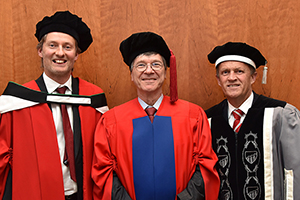Latest News Archive
Please select Category, Year, and then Month to display items
21 July 2021
|
Story Rulanzen Martin
|
Photo Charl Devenish
 Even after her premiership, Helen Zille has remained a powerful force within the South African political landscape. Here she is pictured during a workshop hosted by the Department of Political Science and Governance in February 2020.
Even after her premiership, Helen Zille has remained a powerful force within the South African political landscape. Here she is pictured during a workshop hosted by the Department of Political Science and Governance in February 2020.
Zille will be talking to
Prof Hussein Solomon in the Department of Political Studies and Governance at the University of the Free State.
You can join this interesting discussion on:
Date: 29 July 2021
About the author:
Helen Zille is a South African journalist, activist, and politician who served as the national leader (2007-2015) of the Democratic Alliance (DA), the official opposition party in South Africa. She was also Premier of the Western Cape from 2009 until 2019. Zille’s autobiography, Not without a Fight, was published in 2016.
Prof Jeffrey Sachs presented with honorary doctorate at Spring Graduation Ceremony
2015-10-01

Prof Jeffrey Sachs (centre) with Prof Philippe Burger,
Head of Department: Economics (left), and
Prof HJ Kroukamp, Dean of the Faculty of Economic and
Management Sciences (right).
Photo: Charl Devenish |
“Quality education is the best accelerator for sustainable growth. Universities have a unique role to play in this regard,” Prof Jeffrey Sachs said during a lecture he presented at the University of the Free State (UFS) Faculty of Economic and Management Sciences. He gave an insightful overview of the new Sustainable Development Goals (SDGs) of the United Nations. The 17 SDGs replace the Millennium Development goals of the past 15 years. In a major achievement, 193 countries will sign the goals at the United Nations (UN) in New York on 25 September 2015.
Prof Sachs is the director of The Earth Institute, Quetelet professor of Sustainable Development, and professor of Health Policy and Management at Columbia University. He is also a special advisor to the UN Secretary-General Ban Ki-moon on the Millennium Development Goals, and director of the UN Sustainable Development Solutions Network. Another accolade now added to his résumé is an honorary doctorate in Economics conferred on him by the UFS at the Spring Graduation Ceremony on 17 September 2015 for outstanding achievements and contribution to academia.
“South Africa is not achieving sustainable development. It has the highest inequality in the world with high unemployment among the youth. Quality education is the best accelerator for growth,” Prof Sachs said. He used the high education investment in Korea as an example of that country’s growth. Prof Sachs added that the government cannot achieve the SDGs on its own. “It is important for the country and universities to take on the goals. Universities can apply pressure, influence and provide solutions.”